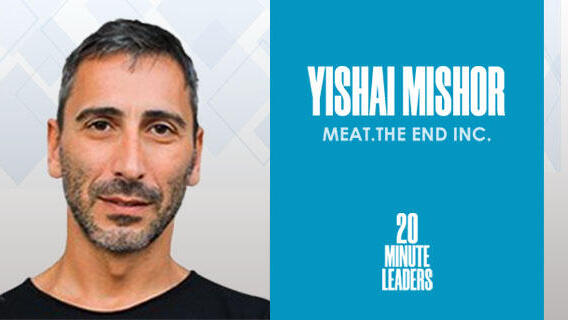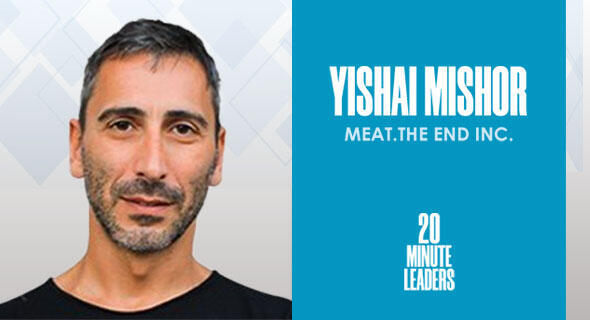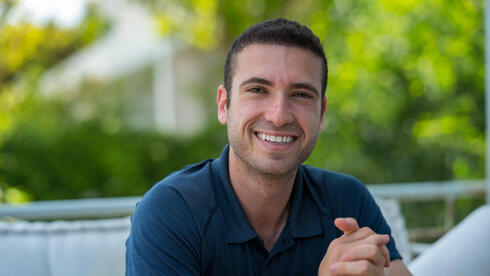
20-Minute Leaders
“The solution is something that each and every one of us can do”
After working for years in government, Meat.The End CEO Yishai Mishor realized that the political arena was not the best place for him to fight climate change
After working for years in government, Yishai Mishor realized that the political arena was not the best place for him to fight climate change. He believes that the food industry is a better place to make an impact and helped found Meat.The End, where he is CEO. He shares that the food industry, particularly the animal-based parts, is very destructive to the planet, spurring deforestation and emissions. Mishor explains that a simple solution to this problem is reducing meat consumption. Meat.The End is creating ingredients and recipes for meat alternatives for other food companies to help the industry make this change more quickly. He says that making alternatives that taste better and cost less will get more consumers on board with eating less meat. Mishor says our food system does not align with our hopes for a healthier planet and healthier bodies, so it needs to change.
Click Here For More 20MinuteLeaders
Yishai, your journey is phenomenal. From the political scene and government to academia to legal tech and startups to now food tech. Tell me a little bit about Meat.The End.
Meat.The End is a food tech company. We are about two years old. We produce and develop protein ingredients for the meat alternative industry with the idea that if we can produce more attractive, more tasty, and cheaper ingredients, that will help the entire industry speed up this transition from meat to the alternatives. What we sell are ingredients and formulas to clients, which are food companies. It's a B2B company. The philosophy behind that is that if we can get in touch with many food companies around the world, that will help us make a wide impact.
Take me back to some of your previous experiences and what lessons you've learned that made a profound impact on the way that you are a leader today.
I studied law and economics for undergrad in Jerusalem. What always attracted me was the macro questions in studies of economics, as well as in law. I always found the big picture to be really intriguing. I did my masters and my PhD in a combination of macro economic theories and constitutional law. I was always very drawn into places where you can use deeper thinking and planning, strategy, to make our lives better.
I worked for about a year in the Israeli Supreme Court. I was very lucky to be the last clerk for Aharon Barak who was Israel's chief justice of the Supreme Court. Right after that, I went to work in the Knesset. The difference between working in the court and working in the parliament is all the difference that you can think of when you think about public policy. What was always really interesting for me is to see how you can generate plans for policy and then see them going. Then I hit reality.
The guy who wrote The Hitchhiker's Guide to the Galaxy, Douglas Adams, said, "It's a well-known fact that people who want to rule other people are those least suited to do it. So anyone capable of getting himself or herself elected president should by no account be allowed to do the job.” It's used as a joke, but there is something inherently problematic when you think about it. What you need to have in you to be elected for a high position in politics is a set of skills that are very different from the ones you need to be a good governor. Most people, if they are good at being elected, they aren't necessarily good at governing.
I was dealing quite a lot with climate change. That's the brick wall. When I realized that this is just unbelievable because it is truly a catastrophe that we are all driving into and there are very clear solutions. And still our political systems over the world just fail to do the obvious. That's the beginning of my realization that politics may not be the right place to advance change in this field.
What was it really about the climate change crisis that, coupled with your own personality, led you to start Meat.The End?
Very quickly I realized that the place to make change as an entrepreneur is through food. Everybody knows that the food industry is, in many aspects, the single most destructive industry to our planet. The food system, and specifically animal-based food industry, has managed to create unbelievably effective mass-scale production capabilities, and this is serving a demand that is much higher than we really need. The outcome is deforestation. About 80% of Amazon deforestation is because of the meat industry. And roughly 20% of global gas emissions, which is the main cause for global warming, is caused because of this industry.
The solution is under our nose. It's something that each and every one of us can do, and that's just to reduce our meat consumption. I'm not vegan; I'm not vegetarian. I eat meat, but I eat meat once a week. If you only reduce twice or three times the amount of meat that you consume per week, that is a huge help if it comes from millions, tens of millions, and then billions of people.
I'm not vegan or vegetarian, but I find myself over time eating less and less meat. I've always said that once alternative products give us a similar experience to the ones we've gotten accustomed to, then we'll be able to drive consumer behavior change. But I'm curious to hear, what does it really take to move the needle?
In every study that I've managed to get that is trying to identify what makes people choose a certain food product over the other, there are two main reasons why people make their choices in the supermarket. Number one is taste, and number two is cost. This is why I think the way we can help accelerate the switch from meat to meat alternatives is by giving out more attractive, more tasty solutions at the right cost. That's the idea behind Meat.The End.
What needs to happen for us to make this leap? Where does Meat.The End fall into this puzzle?
I think the solution is in one word: industry. Right from the start, our company was thinking industry, talking industry, trying to come up with solutions that are industry-relevant. We need solutions that are tasty and cheap and that you can produce on a mass scale. We have a group of really well-experienced veterans of this industry. The advantage that we have here is not only because of their specific expertise in plant-based development, but also their understanding in the strategy of the food industry, in the backstage of the food industry, in how you communicate with food companies.
We are always aiming to talk like the big players and to offer them solutions that are relevant in terms of ingredient price, of the relevance of our ingredients to their production techniques, and so on. If we manage to find solutions that are industry-oriented in scope, we will allow the industry to make this transition more quickly and to offer better products for the consumers.
What's your vision for Meat.The End? How would you describe it three to five years down the line?
It's a global leader of protein ingredients. I see three steps to getting there. We have amazing technology for how to modulate texture in meat alternatives through plant and cultured protein. That's phase number one. We are already there. Next month we are launching our product in one of the leading food chain companies in the world. Step two is making it bigger. Making it so big that you can have influence. And step three, once we become big enough, is to make this impact.
I really want to see a food industry that is more responsible, a food industry that creates healthier food, food that is more healthy to our environment, and food that is more responsible in the sense that it's transparent and shows the consumers exactly what they are buying. We need to get our food system to reflect our plans for the future as a human race. In the end, the companies that make food are the commodities companies, those who sell sugar and corn and flour, and so on. I think that a way to make this industry more responsible is to be involved backstage, in the B2B industry.
Michael Matias, Forbes 30 Under 30, is a Venture Fellow at Innovation Endeavors as well as investment Venture Partner at Secret Chord and J-Ventures. He studies Artificial Intelligence and Human-Computer Interaction at Stanford University, and was an engineer at Hippo Insurance. Matias previously served as an officer in the 8200 unit. 20MinuteLeaders is a tech entrepreneurship interview series featuring one-on-one interviews with fascinating founders, innovators and thought leaders sharing their journeys and experiences.
Contributing editors: Michael Matias, Megan Ryan

